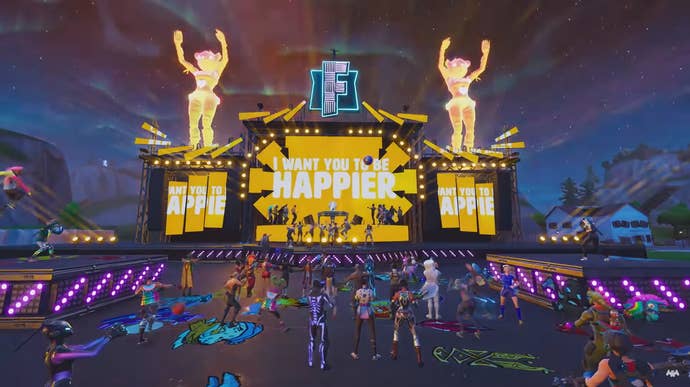Marshmello's Fortnite Battle Royale concert was a blast, but highlights Epic's crediting inconsistencies
I want you to be happier

Last night I went to a Marshmello concert. Marshmello is a DJ that I know almost nothing about – I recognised a couple of his songs when they were played, but without a cue I couldn’t tell you what they sound like, much less any of their names.
The concert also took place entirely within Fortnite Battle Royale, a video game I’ve played only a handful of times, and which I know about almost entirely through second-hand accounts of all the strange developments that take place within.
Still, considering how weird and wonderful those events can be, it's not surprising that this wasn't quite a regular concert.
Right up until the show kicked off, I was pretty convinced it was going to be a disaster. The magnitude of the disaster was still up for debate, but surely, I thought, it was all going to go wrong.
My primary concern was the shooting. Seeing as it’s a battle royale, many of Fortnite’s interesting happenings are interrupted by players thirsty for cheap kills. While some might put down their weapons, others decide to take advantage and kill them. Back when a rocket cracked the sky in two, for example, someone amassed 48 kills at once by breaking the platform where many were watching peacefully.
This time, with 30 seconds left on the countdown to Marshmello’s appearance, shooting was suddenly disabled. Players couldn’t even hit one another with melee attacks; they just bounced off harmlessly.
Briefly, Fortnite Battle Royale essentially ceased to exist. You couldn’t load into a regular game, and the mode for the concert had no murder, no closing storm circle, no victory royale. It just had Marshmello, and a cascade of stage effects.
This wasn’t the first ever virtual concert, but it was a massive demonstration of their potential. Plenty was borrowed from existing physical space events, like beach balls hurled into the crowd – even the giant dancing holograms have precedent. But there’s plenty you can do without the limitations of physical space getting in the way, like messing with gravity as the bass drops, for example. And during the song “Fly,” everyone began to do just that, avatars popping into their gliding animations in a sky lit up more brightly than any real lights would be able to achieve.
The whole thing’s also been captured and edited excellently thanks to Fortnite’s replay feature, and you can watch it on YouTube:
And yet, it does raise some questions about how Fortnite borrows from or merges with other forms of entertainment. Marshmello was presumably paid for his appearance, like anyone putting on a concert should be. Additionally, though, his likeness was put into the game as a skin, and an emote was named after his debut song, Keep it Mello. That’s quite a contrast to the multiple people who are currently suing Epic for allegedly cribbing their dances without permission or payment.
Music is much more straightforwardly copyrightable than dance – in fact, Marshmello had to waive the automatic takedowns that would have otherwise prevented anyone from streaming or posting the event on YouTube. But it’s part of the same collision of worlds, and while it isn’t new, Fortnite is popular enough to accelerate the popularity of anything else it chooses beyond measure.
Last year, Chance the Rapper tweeted: “Fortnite should put the actual rap songs behind the dances that make so much money as Emotes. Black creatives created and popularized these dances but never monetized them. Imagine the money people are spending on these Emotes being shared with the artists that made them.”
Marshmello got all that and more as he lit up Pleasant Park, and while it’s an exciting thought that there will surely be more of these concerts to come, it does leave behind a sense of the lingering erratic nature of who and what gets to share in Epic’s massive pool of attention and money. That's something that's likely to only become more obvious as the company seeks to tie itself more concretely to wider entertainment.








